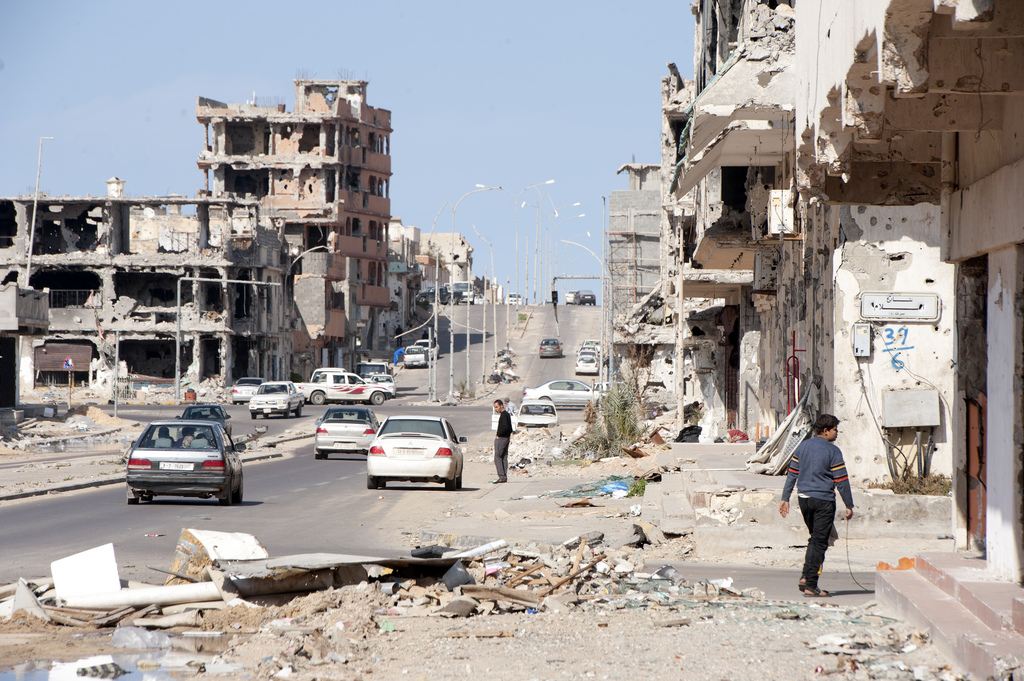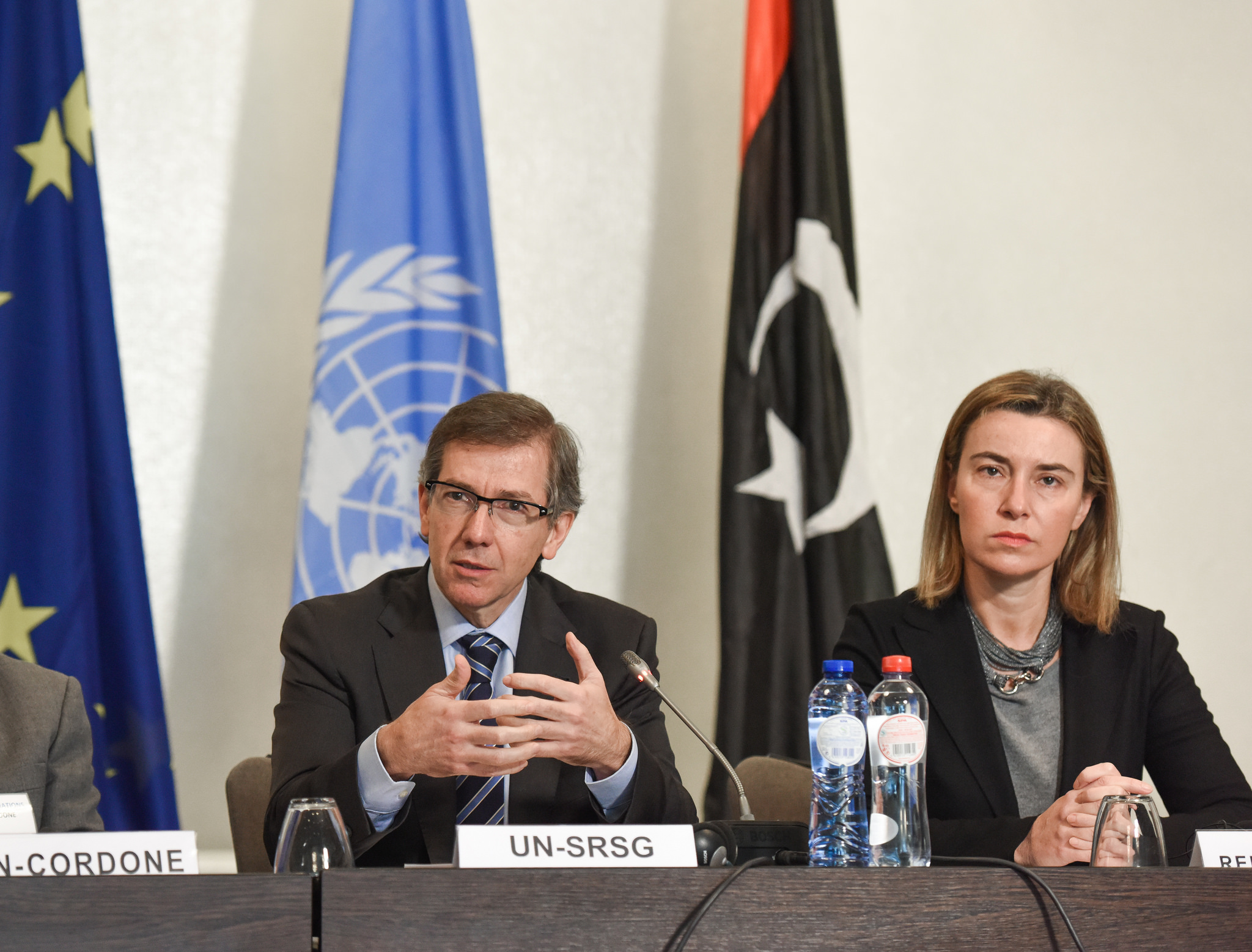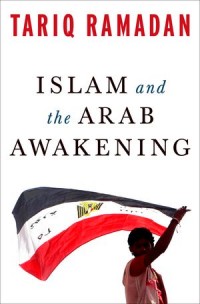
One more disaster in North Africa – News about the fall of Sirte to ISIL (Islamic State of Iraq and the Levant) has produced little reverberations across the Mediterranean. While there seems to be concerns about it, they are mostly about unrest happening “there” and, thus, fortress Europe can only force more measures to fortify itself and make sure that unrest remains where it is. Needless to say, anti-immigration debates continue to be loud, and are largely informed by a worldview at odds with itself, in which host communities are pitted against a deluge of immigrants – a burden on the economy and a marching in of an inflexible and alien culture. The reasoning is as follows: This is not “our” problem; it is “theirs”. The myopia of ownership and the shortsightedness of this view cannot be overstated. ISIL may be a short-term disaster but, more importantly, it is a long-term problem, and not only for North Africa.
The map of North Africa is rapidly changing and the unrest is not geographically bound – To begin with, it is believed that many of the terrorist groups are, in fact, getting their orders from within the depths of Europe. The world is not as divided as it used to be and modern warfare is less about the smuggling of weapons and more about the spread of ideas. So, what is to be done? In this article, I argue that the unrest in North Africa is far from North Africa-bound and that the failure of governments and sopra state bodies to coordinate will lead to an expansion of the chaos. Europe must look inwards – Immediate shifts in the discourse and intervention modalities are needed to address an unfolding crisis.
From Sirte, ISIL is marching south towards Al Jufrah, in the centre of Libya. This will not only cut the country in half but will give ISIS further control of oil fields, more resources to expand its activities and to seize more territory. The Libyan House of Representatives (HoR) has requested international military intervention to support their fight against ISIS. This call, however, was perceived as a call for another round of “imperialism” or “colonisation” which Libya, historically, has known well, all too well. Again, the silence and lack of coordinated action between local, regional and international actors is frustrating.
Cross-Border Movements in the Libyan Conflict
The conflict is not Libya’s alone; it can easily be mapped on a regional and more international canvas. This can be explained in two ways. On the one hand, it manifests itself in cross-border mobilisation of resources. Those resources are not only in the form of arms – there is ample analysis and initiatives on that – but are also ideological; we forget that ideas flow with money and arms. Linkages between Muslim Brotherhood (MB) groups regionally are an example. Of a series of recent interviews with Libyans based in Tunisia, one respondent affiliated with the Muslim Brotherhood related how after the triumph of Beji Caid Essebsi and his secular party, Nidaa Tounis, the core organization of the Brotherhood was forced to relocate to other places in the Region like Algeria and the Sudan. However, he also stated that linkages are still in place. Tunisian MB respondents expressed their support for the Tripoli-government, rejected Sisi’s support for Haftar and accused that camp of treachery. One interviewee went as far as accusing Haftar supporters of apostasy and of severing ties with Islam. Interviews conducted with Libyans residing in Tunisia and not affiliated with the MB pointed out the waning ideological influence of the Brotherhood in Tripoli and described support for the Tripoli government (mostly composed of MB affiliated members) as emerging from the need for stability, and thus, not ideological. In Libya today and for the majority of the population, security trumps ideology. The Brotherhood, however, is adamant in distinguishing itself from ISIL and other terrorist groups like Al Qaeda, even though they are often informed by the same literature of Sayyid Qutb, they disagree on how sharia is to be implemented and enforced.
The civic landscape is also polarised and divided. Organizations with a focus on human rights issues in the east are recording violations against the HoR, but fail to document violations conducted by the HoR. Organizations in Tripoli are doing the opposite. Both are receiving funds through regional and international donors, and some were born in Europe during the Gaddafi period and had their operations relocated to Libya after 2011. The civic chaos is extending the conflict by feeding divisions. And in-between the real victims are the Libyan people who are now clinging further to their region and community, primarily for security.
Proto-State Actors and the European Dimension
The other manifestation of international and cross-border aspects of the conflict in Libya is the existence of proto-state Non-State Armed Groups (NSAGs) such as ISIL. Recent news points to the creation of an alliance between Ansar al-Sharia and ISIL—one that seeks to establish a Caliphate in Libya. ISIL thrives on existing divisions, ethnic, sectarian and economic, within the territories it conquers. The long-term problems of ISIL and its alliances are more critical than the short-term ones because it is an entity that seeks to institutionalise itself, and not only to gain territory or settle feuds.
Interviews conducted with Libyans in London related how combatants against Gaddafi in 2011, some of which were British citizens, who were born and grew up in the UK, found it difficult to return to normality after the first civil war and later joined ISIL and/or militias in Libya. Induction into ISIL can be immediate and random but in many cases, it is gradualist. There is a journey from being a civilian to taking arms to making a living out of it and then to wanting to establish a Caliphate. Those are all different stages worthy of close inquiry and they are often not random. ISIL and other militant Islamist groups have a rationale as well as champions. Respondents in London related how Sadiq Al-Gharyani, Libya’s Mufti who made the call for Jihad against Gaddafi in 2011 and many of his affiliates were in control of militias in Libya and giving orders from their safe homes in London and Manchester, in 2014 and into 2015. According to one respondent, “Al-Gharyani appealed to wannabe extremists. Directly or indirectly, he guided them to that path.”
A British Libyan respondent[i] who went to fight during the war of 2011 in Libya and then returned to the United Kingdom described his motivation to join the war mainly in Islamic terms. His journey to Libya was not easy, he flew from London to Cairo and then to Alexandria and through Alexandria he took the land route to Benghazi and from there, to Tripoli where he joined one of the militias. He described his motivations in two ways; the first was nationalistic and the second was religious but affirmed that although his own motivations were not religious, the religious motivation was generally much stronger with Libyan youth in the diaspora. According to him, in retrospect, it was propaganda by the Islamists that attracted Libyan youth in the UK and Europe to join the fight. Propaganda included news of women getting raped by Gaddafi’s forces and the brutal killing of masses of Libyans. This was followed by a call for jihad, which many Muslim Libyans in Europe perceived as their duty. For him, it was the need “to protect Misrata”, his mother’s city from the Gaddafi forces that made him join the war.
Another respondent related how many of the militias in Libya were educated in Britain. She found this confusing. “You have other people who are educated and doing what they are doing right now… may be to get back by force into Libya and fight against having been excluded all that time.” She further mentioned how orders for fighting are also given from abroad and that the UK has become home to many of the militia leaders. Furthermore, the interviewee highlighted the role of media; Sadiq al-Ghariani, Libya’s Grand Mufti, had his speeches aired in Britain and online and his call for jihad against Gaddafi in 2011 found a big following with British Libyan youth.
There were other motivations to join the war and those included pride and the strong influence of the tribe as a social structure. One respondent related how the participation of British Libyans in the war in 2011 was essentially about pride; “It was to protect our land, our family, our tribe,” she said.[ii] She also mentioned a joke that circulated in 2011 wherein a Tunisian would ask a Libyan to bend his head down to see Egypt, as a means of shaming Libyans for not taking a stand against Gaddafi the same way Egyptians and Tunisians rose against their dictators. That rhetoric of shaming was sharp even to Gaddafi’s supporters; the respondent added: “even if Gaddafi’s presence benefitted you, he was an embarrassment to all Libyans”. Others described it in social media terms. One respondent said that it had much less to do with Islam and much more to do with connecting and the “need for attention”. Reflecting on the case of the three British girls who were headed to Syria, it was ascribed to brainwashing and not because they were isolated from society.
Polarisation and Fragmentation
Another dimension to the situation in Libya is that while it is seemingly polarised between Islamist and anti-Islamist camps, it is not regionally polarised. For example, in Benghazi and in Tripoli, there are militias belonging to both camps. In Benghazi, the fight continues between the Shura Council of Benghazi Revolutionaries, composed of Islamist militias, and Haftar’s army. Members of the Shura Council are affiliated with Ansar al Sharia and other jihadist groups in Misrata. This myopic regional fragmentation is another cause of protracted violence. In addition, the voices of the separatist groups in the east are still very active.
Networks of armed groups, ideological and otherwise, emerged and expanded over time. To control the proliferation and expansion of arms, there is a need to diffuse those networks while working, in parallel, on creating incentives for peace from within. As one analyst put it, “armed groups are very effective at ‘being’ armed groups and rather poor when it comes to the process of engagement” (Program on Humanitarian Policy and Conflict Research, Harvard University, 2007). There was a chance in 2011 and later in 2012 to develop a cogent post-conflict disarmament strategy to absorb militias and youth who were engaged in combat. This did not happen because international actors were quick to pull out assuming that it was time for Libyans to take charge and it was not possible for Libyans to do it on their own, not only because they lacked the institutional structures but also because they lacked the know-how. Mustapha Abdul Jalil, instead, made the fatal mistake of putting those militias on payroll. It thus became a lucrative job for marginalized youth.
The path forward needs to evolve trust and legitimacy through a third party that Libyans would agree on. This would include the following: 1) A realistic and cogent strategy that goes beyond conference halls and seeks to build trust. The world needs the UN to intervene as a strong convening force alongside international actors like the EU. Thus far, however, the UN’s intervention has kept itself to the surface of much deeper changes happening in the country and by engaging extremely problematic figures like Abdelhakim Belhadj, it has lost much of its legitimacy in Libya public consciousness. 2) A regionally-owned intervention towards negotiation, particularly by Egypt, Algeria and Tunisia, collectively and not individually. Those countries have deep historical linkages with Libya and speak its language. Egypt, however, has lost much of its leverage through its military support to Haftar and cannot engage as an impartial party, and not alone. A serious effort at coordination and finding common ground is needed regionally. With fragmented Arab and international policies on Libya, there is little hope for a voice for unity to be sustained within.
Notes:
[i] British/Libyan. Male. Personal Interview. London. March 16, 2015.
[ii] British/Libyan. Female. Personal Interview. London. March 17, 2015.








No Comment